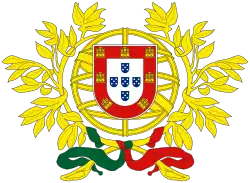| ||||||||||||||||||||||||||||||||||||||||||||||||||||||||||||
| Turnout | 57.0% | |||||||||||||||||||||||||||||||||||||||||||||||||||||||||||
|---|---|---|---|---|---|---|---|---|---|---|---|---|---|---|---|---|---|---|---|---|---|---|---|---|---|---|---|---|---|---|---|---|---|---|---|---|---|---|---|---|---|---|---|---|---|---|---|---|---|---|---|---|---|---|---|---|---|---|---|---|
|
| ||||||||||||||||||||||||||||||||||||||||||||||||||||||||||||
Presidential election | ||||||||||||||||||||||||||||||||||||||||||||||||||||||||||||
| ||||||||||||||||||||||||||||||||||||||||||||||||||||||||||||
| ||||||||||||||||||||||||||||||||||||||||||||||||||||||||||||
155 seats to the Chamber of Deputies 73 seats in the Senate | ||||||||||||||||||||||||||||||||||||||||||||||||||||||||||||
This lists parties that won seats. See the complete results below.
| ||||||||||||||||||||||||||||||||||||||||||||||||||||||||||||
 |
|---|
| Constitution |
General elections were held in Portugal on 28 April 1918, following a coup by Sidónio Pais in December 1917.[1] The elections were boycotted by the Democratic Party, the Evolutionist Party and the Republican Union, who had won over 90% of the seats in the 1915 elections.[2]
Although they included the first direct vote election for the position of President, Pais was the only candidate and the vote was uncontested.[3] In the parliamentary elections the result was a victory for the National Republican Party, which won 108 of the 155 seats in the House of Representatives and 32 of the 73 seats in the indirectly elected Senate.[4][5]
Results
President
| Candidate | Party | Votes | % | |||||
|---|---|---|---|---|---|---|---|---|
| Sidónio Pais | National Republican Party | 513,958 | 100 | |||||
| Invalid/blank votes | – | |||||||
| Total | 513,958 | 100 | ||||||
| Registered voters/turnout | 900,000 | 57.0 | ||||||
| Source: Nohlen & Stöver | ||||||||
Parliament
| Party |  |
 | ||||||
|---|---|---|---|---|---|---|---|---|
| Votes | % | Seats | +/– | Votes | % | Seats | +/– | |
| National Republican Party | 108 | New | 32 | New | ||||
| Monarchist Cause | 37 | New | 10 | New | ||||
| Catholic Centre Party | 5 | +4 | 1 | 0 | ||||
| Other parties and independents | 5 | –8 | 30 | +27 | ||||
| Invalid/blank votes | – | – | – | – | – | – | ||
| Total | 100 | 155 | –8 | 513,958 | 100 | 73 | +4 | |
| Registered voters/turnout | 900,000 | – | – | 900,000 | 57.0 | – | – | |
| Source: Nohlen & Stöver | ||||||||
Aftermath
Pais was assassinated in Lisbon on 14 December.[3] On 16 December João do Canto e Castro was elected by parliament for a "transitional term".[1][6]
